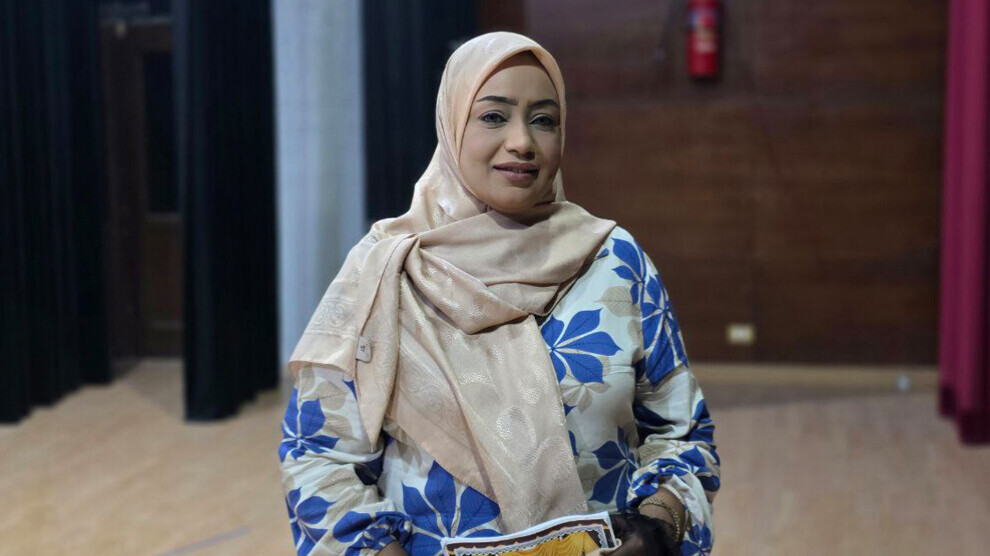Ruqaya’s Story of Resistance Reflected on the Silver Screen…
Having stepped by chance onto the stage, Ruqaya Daw has become the voice of Southern women. Despite social barriers, she views theater as a tool of awareness and calls on women: “Do not be afraid to take the first step.”

MONA TOUKA
Libya – In the heart of Southern Libya, where social challenges intersect with cultural goals, the story of a woman who overcame obstacles and defied expectations has emerged. Civil activist and teacher Ruqayya Daw had never planned on becoming a theater actress. But the opportunities that came her way carried her to the stage and into the world under the spotlight. This experience transformed into a powerful artistic message that reflected the voices of Southern women and revived theater in a region struggling with lack of support and infrastructure.
“My entry into the world of theater was purely coincidental”
Recalling the beginning of her journey, Ruqaya Daw said her step into theater was unplanned and accidental. “To be honest, my entry into the world of theater was purely coincidental. I can’t even say it started as a hobby. I used to frequently visit the popular theater in Sabha as a civil society activist. The director noticed my acting potential,” said Daw, who had her first stage experience with the play “The Beggars” performed at the National Theater Festival in Tripoli.
“I did not feel alone”
Ruqaya Daw continued: “Our time was limited, but we had to participate anyway. This experience gave a lot not only to me but also to the South. It strengthened the culture of art in the region; it gave me strength, patience, and determination. Even though I was the only one, I did not feel alone. All the actors we worked with extended a helping hand. During rehearsals or at the performance in Tripoli, I felt like part of a family. The presence and support of my colleagues were crucial factors in the success of the experience.” She added that this helped reduce the initial fear she felt.
Daw stated that women’s participation in the Southern Libyan theater scene had been limited and continues to be so to this day: “There had been some attempts before me, but they were not sustained. This reluctance turned my experience into a great responsibility; not only because I was representing myself, but also because I was carrying the voices of Southern women on stage and conveying their cultural and artistic messages.”
Social pressures and concerns
Sharing details about her interactions with high-level directors, Daw said:
“When the director came to watch our performance, he was quite impressed. At that moment, I felt great pride and honor, because my role carried a genuine message both to the South and to the art of theater. Southern women face serious challenges in theater. The biggest obstacle, especially in the conservative society of Sabha, is social pressure and family concerns. We don’t even have a permanent theater that could bring together all the theater groups and personnel in the region. Nor are there any training programs or courses to support the development of actors and directors.”
“My acting on stage is not just a hobby”
Explaining that she is a mother of four and carefully plans her work, Daw said: “As a mother of four, a teacher, and an activist, I had to manage my time meticulously. From home to rehearsals, and from there to the performances in Tripoli, every minute was scheduled. Organization and punctuality were essential for me to give my best performance on stage while also continuing my daily work and family responsibilities. My acting on stage is not just a hobby; it carries an educational and cultural message. Sometimes the theater stage reaches the audience in ways that words cannot express. Theater is an art that raises awareness, supports culture, and strengthens the individual’s connection with themselves and with society. The presence of women on the Southern stage sends a powerful message about women’s artistic talents and potential.”
Evaluating the current state of theater in the South, Daw pointed to the lack of consistent theatrical activities and organized theater groups. She said these deficiencies turned her experience into a real struggle, noting that even festivals failed to create a lasting impact. “This situation stems from the absence of official institutions that attract actors and provide them with professional training,” Daw said, emphasizing that the South does not value theater as much as other regions. She added that she often devoted her time and effort without expecting anything in return, and that the lack of appreciation from official institutions and technical teams placed additional pressure on actors.
“Theater is a tool of awareness”
Addressing every woman interested in theater, Daw offered the following advice: “Take the first step and don’t be afraid of the difficulties you encounter. Focus on your goal and on that noble mission of acting. Theater is not justa stage; it is also a tool for education and awareness. We must always look at the positive from the side. In the South, there is a need for a permanent and effective theater that encompasses all communities and technical staff, that provides training programs for both women and men. We hope for the establishment of an organized theater community. Only then can theater become a genuine element of culture and art in society.”
